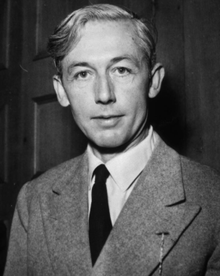Robert Bresson | |
|---|---|
 Bresson c. 1960 | |
| Born | 25 September 1901 Bromont-Lamothe, France |
| Died | 18 December 1999 (aged 98) Droue-sur-Drouette, France |
| Occupation(s) | Film director, screenwriter |
| Years active | 1933–1983 |
| Spouse(s) | Leidia van der Zee (m.1926) Marie-Madeleine van der Mersch |
Robert Bresson (French: [ʁɔbɛʁ bʁɛsɔ̃]; 25 September 1901 – 18 December 1999)[1] was a French film director. Known for his ascetic approach, Bresson made a notable contribution to the art of cinema; his non-professional actors, ellipses, and sparse use of scoring have led his works to be regarded as preeminent examples of minimalist film. Much of his work is known for being tragic in story and nature.
Bresson is among the most highly regarded filmmakers of all time. He has the highest number of films (seven) that made the 2012 Sight & Sound critics' poll of the 250 greatest films ever made.[2][3][4] His works A Man Escaped (1956),[5] Pickpocket (1959)[6] and Au hasard Balthazar (1966)[7] were ranked among the top 100, and other films like Mouchette (1967) and L'Argent (1983) also received many votes.[8] Jean-Luc Godard once wrote, "He is the French cinema, as Dostoevsky is the Russian novel and Mozart is German music."[9]
- ^ "Robert Bresson". Les Gens du Cinéma (in French). 28 July 2004. Retrieved 19 February 2014. This site uses Bresson's birth certificate as its source of information.
- ^ Perez, Rodrigo (17 August 2012). "Sight And Sound Top 250 by the Numbers: And The Auteur with the Most Films Is…". IndieWire. Archived from the original on 21 June 2021. Retrieved 9 October 2024.
- ^ Institute, The British Film. "BFI – Sight & Sound – Robert Bresson: Alias Grace". old.bfi.org.uk. Archived from the original on 3 August 2012. Retrieved 9 August 2018.
- ^ "The 1,000 Greatest Films (Top 250 Directors)". They Shoot Pictures, Don't They. Retrieved 25 June 2016.
- ^ "Votes for A Man Escaped (1956)". British Film Institute. Archived from the original on 2 February 2017. Retrieved 27 January 2017.
- ^ "Critics' Top 100". British Film Institute. Archived from the original on 7 February 2016. Retrieved 23 January 2018.
- ^ "Votes for Au hasard Balthazar (1966)". British Film Institute. Archived from the original on 27 October 2016. Retrieved 27 January 2017.
- ^ "Robert Bresson". British Film Institute. Archived from the original on 13 February 2016. Retrieved 27 January 2017.
- ^ Godard, Jean-Luc (27 June 1972). Godard on Godard; critical writings [This comment on Bresson was taken from a special issue of Cahiers du Cinéma]. Viking Press. p. 47. ISBN 978-0-670-34277-8.